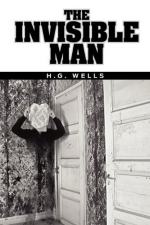“Yes, yes,” said Kemp. “But a man’s not powdered glass!”
“No,” said Griffin. “He’s more transparent!”
“Nonsense!”
“That from a doctor! How one forgets! Have you already forgotten your physics, in ten years? Just think of all the things that are transparent and seem not to be so. Paper, for instance, is made up of transparent fibres, and it is white and opaque only for the same reason that a powder of glass is white and opaque. Oil white paper, fill up the interstices between the particles with oil so that there is no longer refraction or reflection except at the surfaces, and it becomes as transparent as glass. And not only paper, but cotton fibre, linen fibre, wool fibre, woody fibre, and bone, Kemp, flesh, Kemp, hair, Kemp, nails and nerves, Kemp, in fact the whole fabric of a man except the red of his blood and the black pigment of hair, are all made up of transparent, colourless tissue. So little suffices to make us visible one to the other. For the most part the fibres of a living creature are no more opaque than water.”
“Great Heavens!” cried Kemp. “Of course, of course! I was thinking only last night of the sea larvae and all jelly-fish!”
“Now you have me! And all that I knew and had in mind a year after I left London—six years ago. But I kept it to myself. I had to do my work under frightful disadvantages. Oliver, my professor, was a scientific bounder, a journalist by instinct, a thief of ideas—he was always prying! And you know the knavish system of the scientific world. I simply would not publish, and let him share my credit. I went on working; I got nearer and nearer making my formula into an experiment, a reality. I told no living soul, because I meant to flash my work upon the world with crushing effect and become famous at a blow. I took up the question of pigments to fill up certain gaps. And suddenly, not by design but by accident, I made a discovery in physiology.”
“Yes?”
“You know the red colouring matter of blood; it can be made white—colourless—and remain with all the functions it has now!”
Kemp gave a cry of incredulous amazement.
The Invisible Man rose and began pacing the little study. “You may well exclaim. I remember that night. It was late at night—in the daytime one was bothered with the gaping, silly students—and I worked then sometimes till dawn. It came suddenly, splendid and complete in my mind. I was alone; the laboratory was still, with the tall lights burning brightly and silently. In all my great moments I have been alone. ’One could make an animal—a tissue—transparent! One could make it invisible! All except the pigments—I could be invisible!’ I said, suddenly realising what it meant to be an albino with such knowledge. It was overwhelming. I left the filtering I was doing, and went and stared out of the great window at the stars. ‘I could be invisible!’ I repeated.




